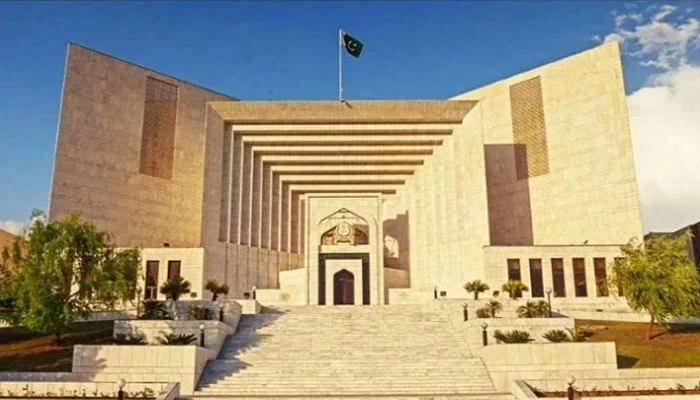Interim order passed by SC on April 4, 2023 may be vacated: PML-N.
Federal govt says SC Act gives right of appeal in contempt cases.
Parliament has the power to legislate, argues federal government.
ISLAMABAD: The federal government submitted its written reply to the apex court on Thursday, stating that the judiciary’s freedom was ensured by the Supreme Court (Practice and Procedure) Act 2023.
At the last hearing, the top court’s full court bench headed by Chief Justice Qazi Faez Isa sought replies from all parties by September 25. However, the federal government submitted its written submission today as Attorney General for Pakistan (AGP) Mansoor Usman Awan was out of the country in connection with a case.
In response to the question if the impugned law is sustained, what will be the fate of the cases heard by benches constituted by the chief justice after the enactment of the impugned Act? the Centre stated: “For the purposes of addressing the query it is important to draw a distinction between benches which were constituted and have rendered judgments and those benches which are still hearing petitions and have not rendered final judgments. In the event the impugned act is sustained, the former stands to be saved under past and closed transactions and the latter will merit for the benches to be reconstituted under Section 2 and 3 of the impugned act and the proceedings in such cases be held afresh.”
It further said that the right of appeal has been accorded under Section 5 of the Impugned Act against judgments arising out of the exercise of jurisdiction under Article 184(3) of the Constitution.
“The original jurisdiction of this Court under Article 184(3) is sui generis in nature, and cannot in the traditional sense be bifurcated into criminal or civil,” it added.
‘Enlargement of jurisdiction’
To another query, the government said: “We believe that there could not be any other view except that the Constitution favours enlargement of the jurisdiction of the Supreme Court and conferment of supplemental powers.”
Under the scheme of the Constitution, the top court is empowered to deal with the matters falling within various types of the jurisdiction conferred upon it, i.e., original, appellate, advisory and review, read the statement.
“Parliament has also enlarged the territorial jurisdiction of the SC and included within its jurisdiction the territories of Provincially Administered Tribal Areas of Chitral, Dir, Kalam, Swat and Malakand Protected Area, through the Supreme Court and High Court (Extension of Jurisdiction A certain Tribal areas) Act, 1973.”
PML-N seeks dismissal of pleas challenging SC Act
In its concise statement, Pakistan Muslim League–Nawaz (PML-N) pleaded with the top court to dismiss the petitions challenging the law clipping CJP’s powers.
On behalf of the PML-N, its counsel Salahuddin Ahmed submitted a written reply to the top court regarding to the matter.
“The PML-N contends the SC Act 2023 is intra vires the Constitution and is good law. As such, all the instant petitions challenging the same may be dismissed and the interim order passed by this court on April 4, 2023, may be vacated,” read the statement.
It further said that the interim order passed by the Supreme Court to the effect that “the Act that comes into being shall not have, take or b given effect nor be acted upon in any manner” is unprecedented and contrary to the jurisprudence of the apex court.
It is pertinent to mention here that an eight-member larger bench of the apex court in April had ordered that even if the SC (Practice and Procedure) Bill 2023 received the assent of the president, the bill would not be acted upon in any manner till further order.
“The moment that the Bill receives the assent of the President or (as the case may be) it is deemed that such assent has been given, then from that very moment onwards and till further orders, the Act that comes into being shall not have, take or be given any effect nor be acted upon in any manner,” read the interim order issued by the top court’s eight-member larger bench — headed by then-chief justice of Pakistan (CJP) Umar Ata Bandial.

